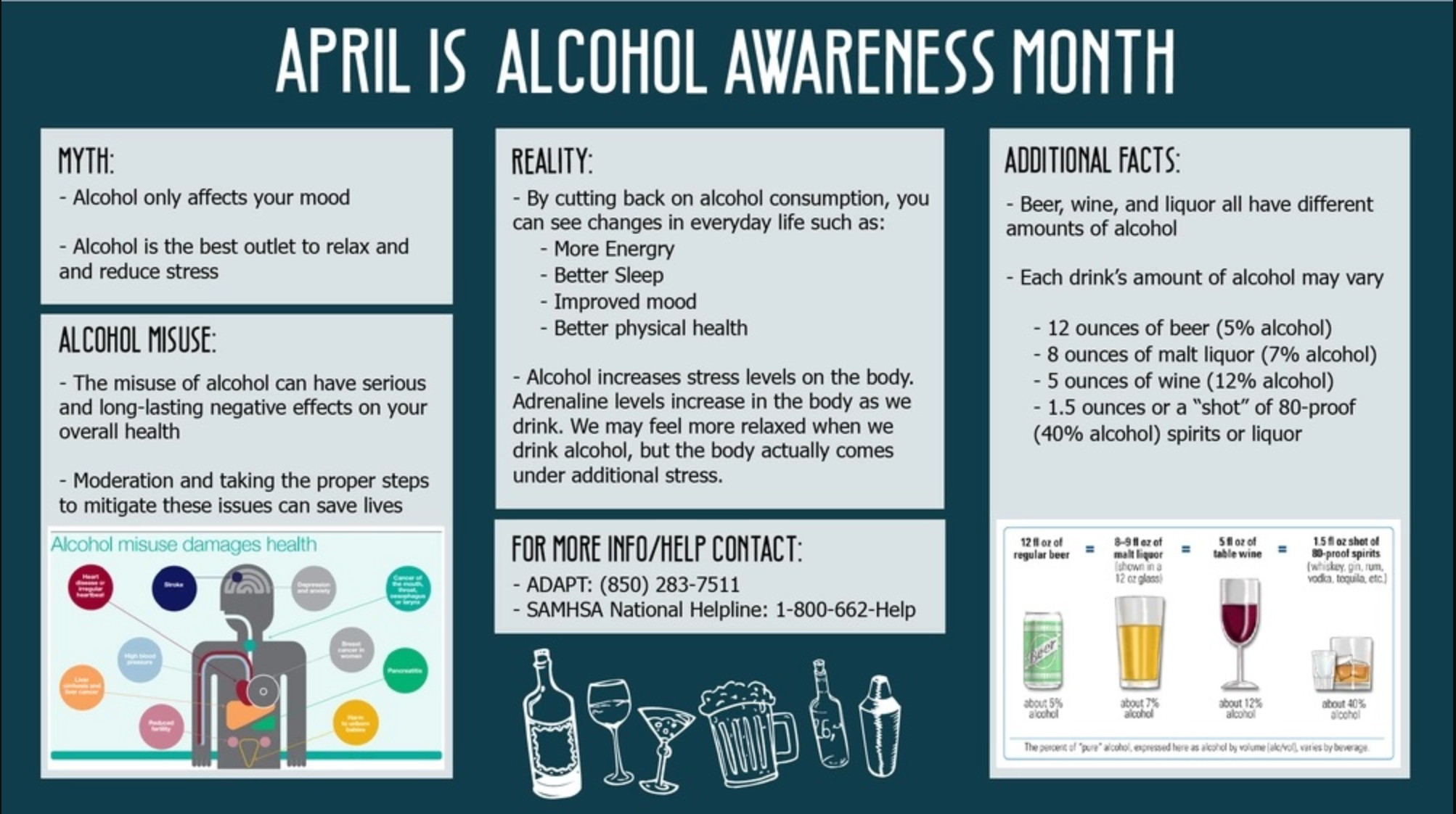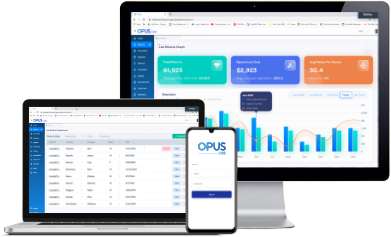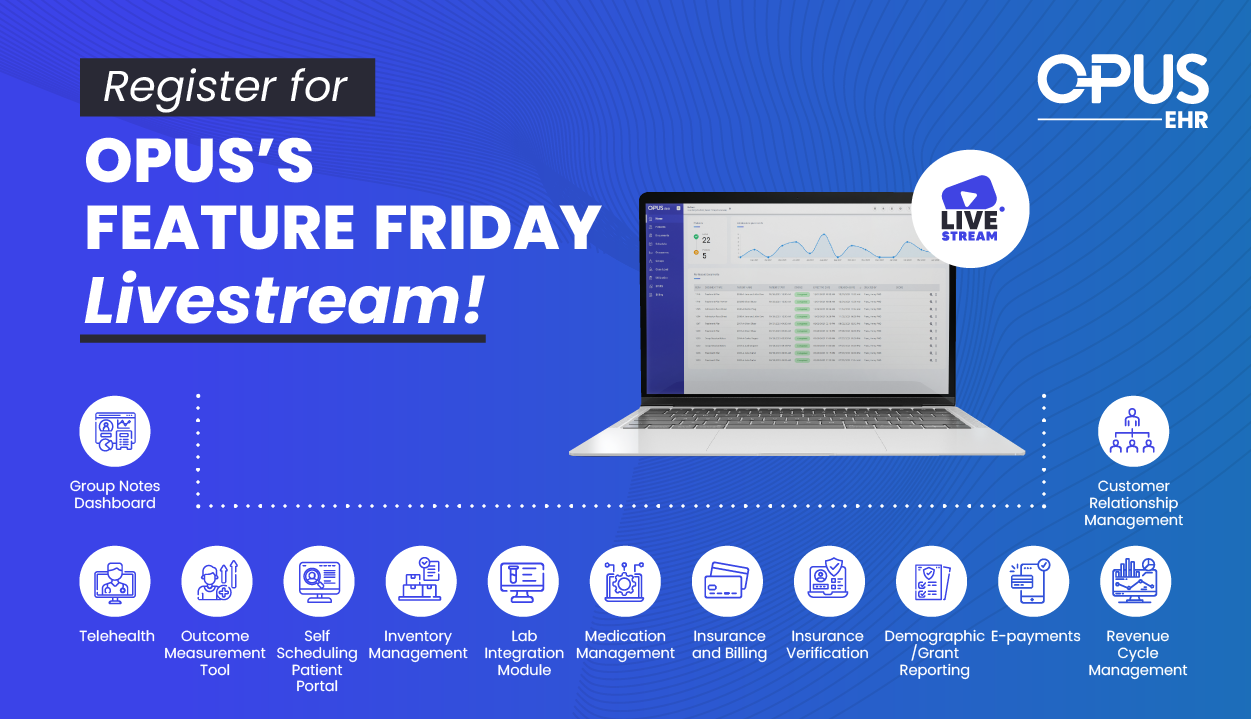
Opus Spark April 2023
CEO’s Message
As the CEO of a behavioral health technology company, Opus EHR, I want to take a moment to highlight the importance of Alcohol Awareness Month, which is observed every April. This is a time when we raise awareness about the dangers of alcoholism and related issues, such as underage drinking and drunk driving.
Alcoholism is a severe problem that affects millions of people across the country and can lead to various negative consequences, including health problems, relationship issues, and financial struggles. In addition, alcohol-related accidents and injuries are a leading cause of death among young people in the United States. By shedding light on the issue of alcoholism and related issues, we can help to raise awareness and promote healthy behaviors. This includes encouraging individuals to drink responsibly, seeking help if they or a loved one is struggling with alcoholism, and supporting policies and programs that promote safe and responsible alcohol consumption.
I also want to recognize clinicians' incredible work in mental health and addiction treatment. Every day, they are on the front lines, providing care and support to individuals struggling with some of the most challenging issues of our time. Their dedication and commitment to their patients are truly inspiring, and I am honored to work with them to support practice operations. They address critical issues with a recovery plan in this important work.
Our company is committed to developing innovative technology solutions through efficient processes and deliverability of information, where clinicians can focus more on helping individuals and families dealing with alcoholism and related issues. Our features and services are designed to support treatment and recovery practice providers, clinicians, and practitioners to help individuals overcome their addictions and achieve long-term success. Learn more about how Opus can help your practice at www.opusehr.com
During Alcohol Awareness Month and throughout the year, we encourage everyone to take action to raise awareness about this critical issue. Whether participating in local events, sharing information with friends and family, or supporting organizations working to address alcoholism, we can all make a difference in promoting a healthier, safer, and more responsible society.
If you or someone you know is struggling with alcohol addiction, refer to this site for assistance, https://alcohol.org/treatment/hotline/
National Drug and Alcohol Treatment Hotline 1-800-662-HELP (4357)
National Alcoholism and Substance Abuse Information Center 1-800-784-6776
Thank you for being so committed to promoting awareness and positive change in our communities.
Trey Wilson
Chief Executive Officer
Opus EHR

Meet Amanda Wilson, the Director of Clinical Virtual Services at Mindful Health, where she provides therapy services and serves as a clinical leader to the virtual team. As her leaders share, she's also a shining example of what it means to go above and beyond for others. Known for her compassionate approach, Amanda helps people tackle tough topics like anxiety, depression, trauma, and relationships - and she doesn't stop there. Amanda is a true team player, always willing to lend a supportive hand to both her colleagues and the community. Whether it's providing counseling, leading CEU events, or just being a listening ear, Amanda is the epitome of what it means to be an exemplary clinician.
With degrees in both Social Services and Law and Social Policy, Amanda has dedicated her career to providing exceptional clinical support to children, adults, and families. She is committed to providing "intentional and exceptional care" within a Mindful Health mission. Amanda works tirelessly to ensure that the client and their families are supported, having prior social work experience. It is not uncommon for Amanda to work in-between sessions, pulling resources for clients and communicating with clients/families via phone and email to follow up!
During the development stages of implementing Opus EHR, she enjoys the support from the Implementation Specialist Adi Tiwari helpful in integrating current practices. Amanda says that it has been an easy process to transition to Opus. With the intentional efforts of the helpful team, navigating through the transition has been a breeze. She is looking forward to Opus's intuitive nature to aid in their practice's efficiency.
Amanda has an upbeat spirit; she loves to laugh, enjoying stand-up comedy and the general folly of life.

April is designated as Alcohol Awareness Month by the National Council on Alcoholism and Drug Dependence (NCADD) to raise awareness and educate individuals and communities about the dangers of alcoholism and related issues. This month-long observance provides an opportunity to focus on the impact of alcohol on individuals, families, and communities and to promote healthy behaviors and lifestyles.
Alcohol abuse and addiction are significant public health problems in the United States. According to the National Institute on Alcohol Abuse and Alcoholism (NIAAA), an estimated 14.5 million adults in the United States had an alcohol use disorder (AUD) in 2019. AUD is a chronic, relapsing brain disease characterized by compulsive alcohol use, loss of control over drinking, and negative emotional and physical consequences.
Alcohol abuse and addiction can lead to various adverse health outcomes, including liver disease, cancer, heart disease, and mental health disorders. Alcohol-related accidents, injuries, and fatalities are also significant concerns. In 2019, an estimated 95,000 people died from alcohol-related causes in the United States.
During Alcohol Awareness Month, the NCADD promotes various activities and events to educate individuals and communities about the dangers of alcohol and to encourage healthy behaviors. These activities include educational workshops, community events, and social media campaigns. The NCADD also provides resources and support for individuals and families affected by alcohol addiction.
Alcohol Awareness Month is an important public health program that helps to raise awareness of the dangers of alcohol abuse and addiction and to promote healthy behaviors and lifestyles. It provides an opportunity to educate individuals and communities about the risks associated with alcohol use and to encourage individuals to make informed decisions about their alcohol consumption. By raising awareness and promoting education, we can work together to reduce the negative impact of alcohol abuse and addiction on individuals, families, and communities.
Resources:
- SAMSHA – what educators can do to prevent alcohol addiction.
- Get Involved in Alcohol Awareness Month.
- Raising Awareness About Addiction In Your Community.
- View Success Stories.
- National Today: History of Alcohol Awareness Month.
Join us for a captivating webinar that will revolutionize your approach to contract negotiations. Unlock the key to profitability in your practice with insights from Aroris Health's top expert, and gain the upper hand in provider-payer relationships. Discover the latest financial technology trends and leverage proven solutions to boost your bottom line. Learn how digital platforms and tools can streamline your contract management and elevate your price negotiation game. Don't hesitate - to reserve your spot today and gain the tools you need to achieve practice success!
“7 Ways to Grow Your Practice Profits: Reimbursement Secrets Revealed.”
Join us every 3rd Friday as we dive into Opus feature updates based on client requests, upgrades, and what's new in the industry! We are here to meet your practice where it is to take your operations to the next level!
Our next Feature Friday will be held on Friday, April 21st, at 3 PM EST.
We will share feature functionality, have an audience Q&A session to address all questions, and take your inquiries on features you wish your systems had as we add to our roadmap. Opus is here as your Behavioral Health Treatment solution for all your operational needs! Register here!
.png)
Stress is an inevitable part of life, affecting everyone at some point. However, when stress becomes chronic or overwhelming, it can adversely affect our mental and physical health. That’s why April is designated as Stress Awareness Month to raise awareness about stress management's importance and provide individuals with the tools they need to manage stress effectively.
Stress Awareness Month is an annual campaign that aims to raise awareness about the causes and effects of stress and the importance of managing stress. Pressure can come from many sources, such as work, relationships, finances, health issues, and significant life changes. Stress can manifest in different ways, such as physical symptoms like headaches, muscle tension, and fatigue, as well as emotional symptoms like anxiety, depression, and irritability.
Stress can adversely affect our health, including an increased risk of heart disease, stroke, and other chronic conditions. Stress can also have a negative impact on our mental health, leading to depression, anxiety, and other mood disorders. That’s why managing stress effectively is essential to maintain our physical and psychological health.
There are many different strategies for managing stress. These strategies include exercise, meditation, deep breathing, and relaxation techniques. Getting enough sleep, eating a healthy diet, and staying connected with loved ones can also help reduce stress. It’s essential to find the stress management strategies that work best for you and to make them a part of your daily routine.
During Stress Awareness Month, organizations and individuals can participate in activities and events that promote stress management and awareness. These can include educational workshops, stress management training, community events, and exercise tracking contests. Social media campaigns and online resources can also help spread awareness about stress management and provide individuals with the tools they need to manage stress effectively.
Stress Awareness Month is a significant opportunity to raise awareness about stress management's importance and provide individuals with the tools they need to manage stress effectively. By promoting stress management strategies, we can help individuals maintain their physical and mental health, reduce the negative impact of stress on their lives, and lead happier, healthier lives.
Behavioral health and mental health practitioners are crucial in helping individuals manage stress. Practicing what you preach and modeling effective stress management strategies for your clients is essential as a practitioner. Here are some tips for managing stress as a behavioral health or mental health practitioner:
Practice self-care: It’s essential to prioritize self-care, including getting enough sleep, eating a healthy diet, and exercising regularly. Make time for activities that bring you joy and relaxation, such as hobbies or spending time in nature.
Practice mindfulness: Mindfulness techniques such as deep breathing, meditation, and exercise can help you stay focused and centered, even in stressful situations. Incorporate these techniques into your daily routine to reduce stress and increase overall well-being.
Set boundaries: As a practitioner, you must set clear boundaries with your clients and create a healthy work-life balance. Schedule self-care, rest, and relaxation time, and don’t be afraid to say no to extra work or commitments.
Seek support: It’s essential to have a support system of colleagues, friends, and family who can offer emotional support and help you manage stress. Don’t be afraid to ask for help or support when needed.
Practice effective time management: Effective time management strategies, such as prioritizing tasks and delegating responsibilities, can help you manage your workload and reduce stress. Make sure to schedule time for self-care and downtime, and don’t overcommit yourself.
Practice gratitude: Practicing gratitude and focusing on the positive aspects of your work and life can help reduce stress and improve your overall well-being. Take time each day to reflect on what you’re grateful for and to express appreciation to those around you.
Managing stress is essential for maintaining your well-being and providing adequate care to your clients. By practicing effective stress management strategies, you can reduce stress and improve your overall well-being personally and professionally.

Behavioral health treatment centers play a crucial role in providing support and care for individuals struggling with mental health and addiction issues. However, many treatment centers need help managing administrative tasks, such as scheduling appointments, managing patient records, and billing. These administrative tasks can be time-consuming and take away from the valuable time clinicians and staff members could spend with their patients. That’s where automation and advanced Electronic Health Records (EHR), such as Opus EHR software offers, come in.
Opus EHR's automated and advanced software helps treatment centers streamline administrative tasks, freeing up valuable time for clinicians and staff members to focus on patient care. By automating scheduling, billing, and patient record management processes, treatment centers can save time, reduce errors, and improve overall efficiency. This, in turn, can lead to improved patient outcomes and increased patient satisfaction.
Here are some of the benefits of automating processes within behavioral health treatment centers using advanced Opus EHR software:
Increased efficiency: Automated processes can significantly reduce the time it takes to complete administrative tasks, such as scheduling appointments and managing patient records. This can improve overall efficiency and help treatment centers see more patients.
Improved accuracy: Automated processes are less prone to errors than manual processes. This can improve the accuracy of patient records, billing, and other administrative tasks, reducing the risk of errors that could impact patient care or lead to financial losses.
Increased patient satisfaction: By reducing wait times and streamlining administrative tasks, patients may have a more positive experience with the treatment center, improving patient satisfaction.
More time for patient care: By automating administrative tasks, clinicians and staff members can focus on providing high-quality patient care rather than spending valuable time on administrative tasks.
Enhanced data analysis: Advanced Opus EHR software can provide treatment centers with valuable data and analytics to help them improve their processes and outcomes. This can help treatment centers identify areas for improvement and make data-driven decisions to improve patient care.
In conclusion, using advanced Opus EHR software will involve automating processes within behavioral health treatment centers and can provide many benefits, including increased efficiency, improved accuracy, increased patient satisfaction, more time for patient care, and enhanced data analysis. By embracing automation and advanced EHR software, treatment centers can optimize their operations, improve patient outcomes, and provide better care for individuals struggling with mental health and addiction issues. To view the software for yourself, schedule a consultation with our experts today!
Opus EHR is excited to share that the team has developed a new process for automating workflows of clinical claims sheets and clinical hours to submit claims called Automated Data-Quality Review.
It is an automated process within the software that tracks the hours of group sessions to show how many the client has met from the expected total based on the Level of Care. This process includes the automation of clinician session hours, notes, and communication of patient-providers throughout the care process to be used for tracking and submitting into a claim submission.
With this feature, clinics no longer have to manually complete charge slips and charts to submit their claims for quality review, as required by some states for PHP/IOP/OP services. Keeping the Clinical team’s goal in mind of providing services efficiently and effectively, Opus custom-built an automated process called ‘Automated Data-Quality Review,’ is the first of its kind to support their operational needs. In addition, Opus combined tracks group notes and the billing to be a simple one-click clinical documentation process. This new feature is a game changer and will help clinics reduce administrative tasks and redirect their efforts toward delivering high-quality care to patients.
"This process will simplify our operations to save so much time," says Director of Clinical Services Amanda Wilson. "We will no longer have to pull so many charts per quarter manually and have a timelier billing process for quicker reimbursements."
Schedule a Consultation to Learn More!
Our team is constantly adding new tools and innovating features that practices need as we get feedback from our valued clients.
If you are interested in upgrading your operations by giving Opus EHR a try, click to watch our demo below or schedule a meeting for a virtual demo today!
.png)



%20(2).png)

